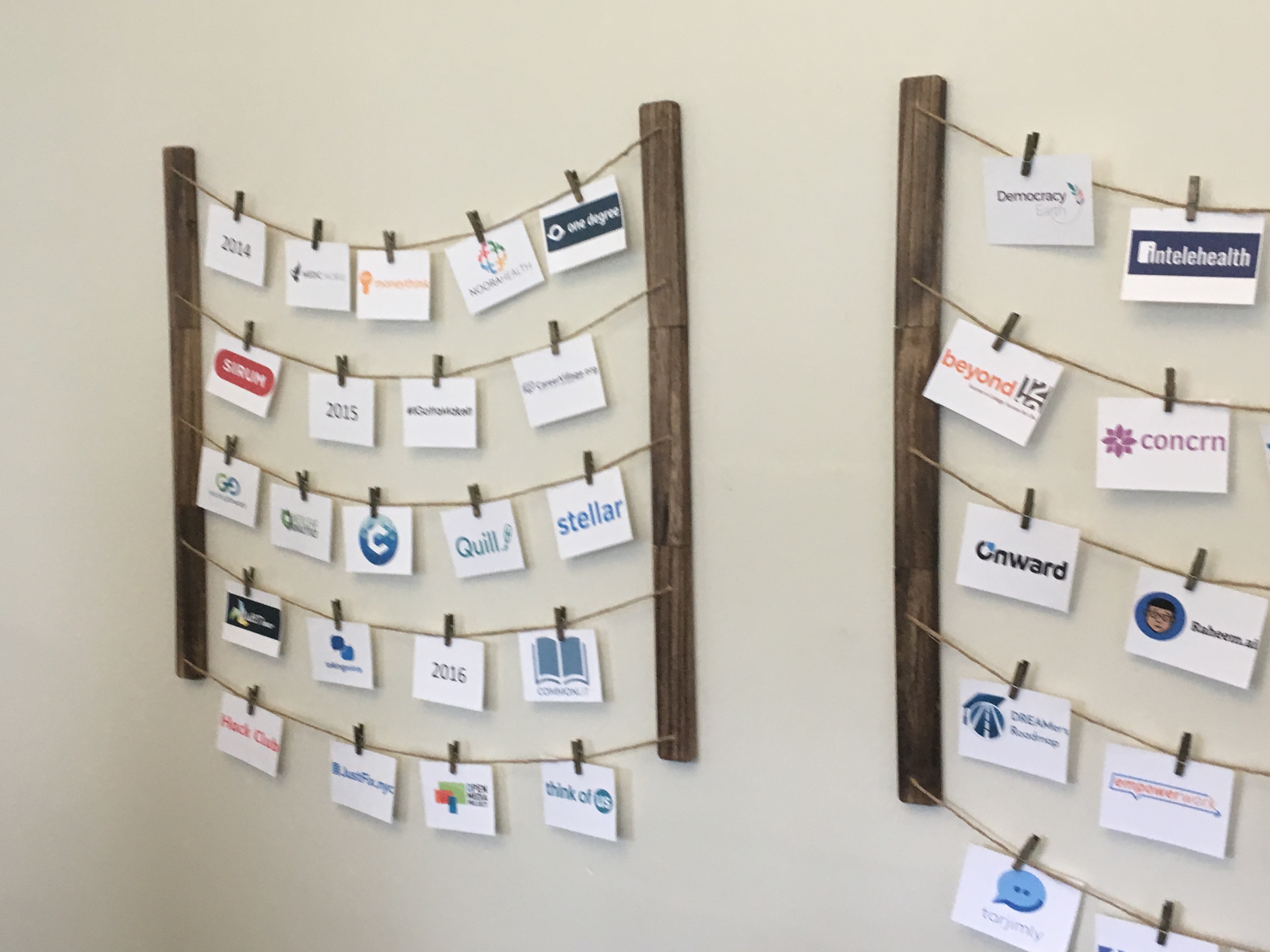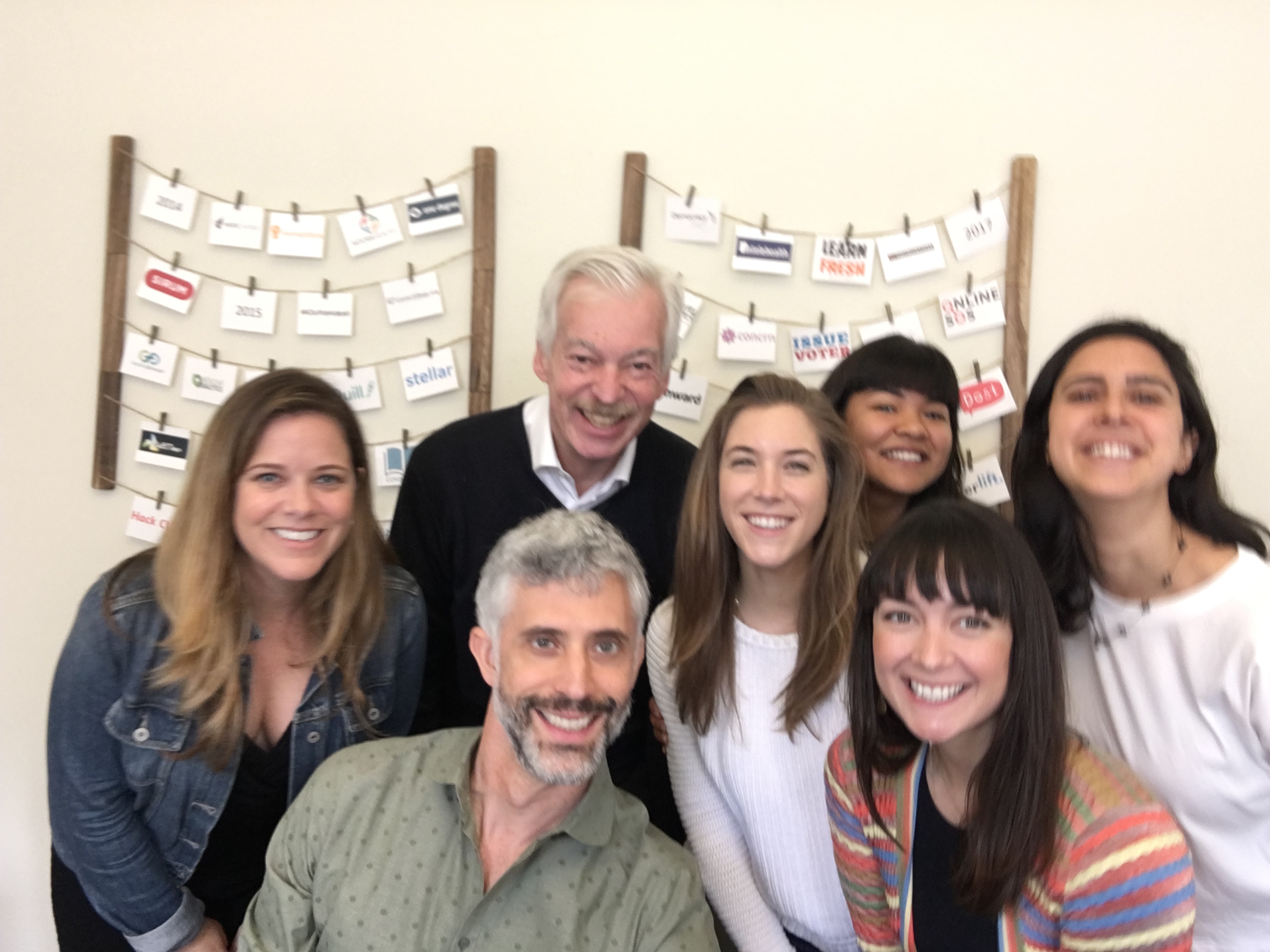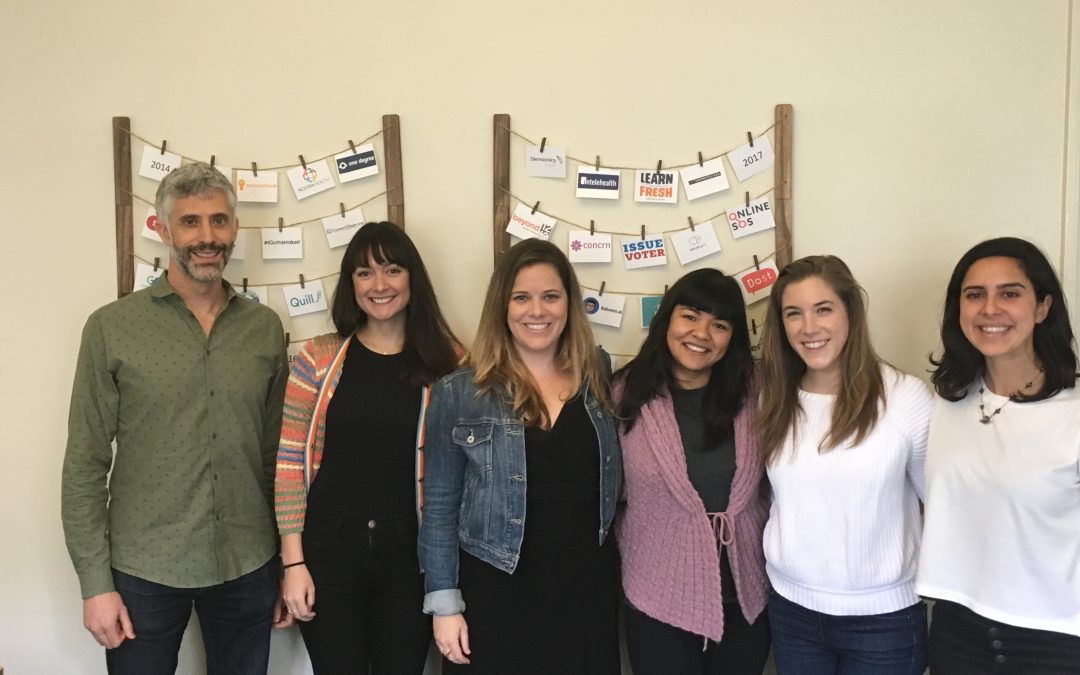Better Than Most is a regular feature of The Business of Giving, examining the best places to work among social good businesses and nonprofit organizations.
Denver: And for this edition of Better Than Most, we will be going to The Presidio in San Francisco into the home of Fast Forward, an organization that invests in entrepreneurs who are using technology to accelerate social impact. Let’s hear from some of the members of this close-knit team on why it is such an exceptional place to work.
Shannon: We use two words to describe Fast Forward’s culture, and that is that we are “impatient optimists.” We really believe that a group of smart, dedicated, hard-working people can change people’s lives all over the world, people we’ve never even met. That is our north star, and we are impatient about it. We’re tired of waiting for the change we want. So, how that plays out in our culture is that we have a bias towards doing.
Kevin: We have five core values at Fast Forward. The first is Justice. Fast Forward is really a social justice organization, masquerading as a tech accelerator, and we believe that our social problems deserve the best tech, so we keep justice at the core of what we do. Our second organizational value is Action. You’ve heard from a couple of people this vibe towards action. We train it. That’s a big part of our summer Accelerator training that the organizations keep their main thing the main thing. We really look to… because we work primarily with organizations that look like tech startups, even though they’re nonprofits, we think it’s important that they experiment and move quickly. You might have noticed that our motto is, “Accelerate Good.” Obviously, that implies motion and action. The third organizational value is around Gratitude. You’ve heard people mention that it takes a village to build this ecosystem of support for tech nonprofits, so we rely on many people to create our impact in the world, and we’re always asking people for their time, money, advice, and expertise. It’s important to us to be grateful for all the people that are helping us, and all organizations that we support be successful and create the change they want to see in the world. Our fourth organizational value is Courage. It’s not always easy to ask people for help and support, and we do make a lot of big asks of people. We think it’s also important that people view philanthropy as risk capital; that not everything that’s on the space is going to work, but we want the people to have the courage to try to make a difference. Fifth thing that’s important to us is the organizational values around community. You’ve heard a couple of people mention already the importance of family and how Fast Forward feels like a family. We’re also, as you mentioned, building a movement. For us, this community of support is incredibly important. It manifests itself in different ways. You’ll see during the holidays, we’ll get holiday cards from people that they’ll mostly send to friends and family, we’ll get here in the office. Even as a tech accelerator in many ways, we’re really a people organization, and so community is the core of what we do.

Celia: I would like to talk about the hiring at Fast Forward and what’s unique about it. One of the things that I found very unique was having the chance to speak to everyone at Fast Forward. It was my first time meeting the team. It was my first time meeting the leadership team separately. That, to me, was different because coming from the larger corporation where you really only talk to a few people, and you never really meet what you would call your “true boss” until way later down the road, it was very unique and interesting and transparent and made me feel like I could have a voice here.
Christina: Certainly it definitely contributes to the community aspect of the work that we do, that everyone on the team has a voice in these big decisions that we’re making. Everyone on the team has decision-making abilities when we’re choosing who we want to fund and support.
Nicole: Something that’s quite unique at Fast Forward is given the nature of our work, anytime there is a tech nonprofit win generally, it feels like a win for Fast Forward, and we are in the office celebrating. For example, our alumni, Tarjimly, launched their new app last week, and we were putting in lots of work to make sure that that was successful, and celebrating when their launch party went really well. How many other organizations can say that about their industry? Something else that’s quite unique to Fast Forward is that because the tech nonprofit sector is new and emerging, there is really no guide book. So, as an organization and as a community, we are making up the rules every single day, and it’s so exciting to be a part of an organization that is on the cutting edge in that way.
Hillary: We are always trying to stay as close to the work as possible and remember the end goal of what we’re doing as an intermediary which is the role that we play connecting and bridging between the tech nonprofits that we serve and all of their supporters in the world, funders and volunteers and things like that. In this intermediate role, we get to have a really interesting perspective and build a lot of relationships with different people but we are in return just a bit further removed from the actual social impact work.

Shannon: There’s formal feedback processes in which we have one-on-ones, and we have review processes. But because we work so closely, we practice, “ If you see something, say something.” Treat people with respect and dignity because that’s a core justice value. You have to tell people right away if something’s not working because we can’t fix anything if we can’t fix it together. It’s particularly poignant in this moment where the tech sector is really being taken to task for violating core principles of dignity. We have to practice what we want to see in the world within our organization.
Christina: Here, I feel like we’re all working super hard every day and very mission-driven but there’s also… I feel like because we’re trying something new, we all have each other’s backs, and we know we’re going into unchartered territory. We don’t know if this is a tried and true thing that’ll work. At a baseline, we all support the risks that we’re taking. I feel like because we have that feeling of support and knowing that our colleagues believe in what we’re doing both at work and outside of work, that it makes me personally feel more comfortable bringing people outside of my work nucleus into it. That’s definitely not something I felt at other places.
Celia: I had no clue that all of these nonprofits were all working together here in the Presidio. And when I arrived, I couldn’t believe that this could happen. Wow, people actually have offices there. You can take a stroll through the gardens. That to me was the Wow of the space. I think specifically with the way we made our office, this is actually a home. This used to be a surgeon’s home, and we are actually sitting in someone’s living room. The fact that we made our home literally an actual space where you can feel cozy and comfortable… We constantly open it up to alumni who drop in every once in a while to billet their products. We haven’t really hosted events here but we have our own happy hours here where we get together after our meetings and whatnot. It just always feels like, all the family’s spread out in the room but then everyone just comes back together here in this family room.
Hillary: We have fun things that we like to talk about that are recurring themes. We often share recipes. There is one recipe right now that five of the six of us have attempted to cook or might be cooking. There’s a sixth that’s a standout. We all compare notes and share tips and things like that. We also have a fitness challenge that we’re trying to make daily where we all get together on the floor in one room and do planks. Fun things like that. We go to workout classes, some of us together.
Nicole: A way that we celebrate the victories at Fast Forward is with our very important meetings. I remember on my first week, I got a calendar invite that said we had a very important meeting the next week, and I was kind of nervous. I got there, and I realized that it was a time to close the laptops and take a little adventure to a new local bar or restaurant that I hadn’t been to before and simply celebrate whatever milestone it was.
Shannon: These people are really talented, technical leaders. They could go work anywhere, and they’ve chosen to run nonprofits because they care deeply about the social issue they want to solve, but that’s pretty hard to explain to your mom. If you could go get a job at Google or Facebook, “Why are you making no kind of money, working out of your bedroom for years trying to launch this tech nonprofit?” We hear it all the time. Every time we get one of our team’s story told in a space that is public and celebrated, it changes how their families feel about them. It changes how their communities feel about them, and it gives them a jolt to do more good. That’s the part that keeps us grounded in the social sector piece of our work. It does look like a tech startup because we are a tech startup, but we can be a hundred percent focused on impact, and where it really sings is in the stories.
Kevin: The tech nonprofit culture is particularly unique because it incorporates the excitement, innovation, enthusiasm, and speed of tech startup culture, but also the passion, mission, focus of a nonprofit. For our entrepreneurs, for many of them, this is their life’s work. Almost all of them have personal experience with a problem that they’ve set out to solve. That’s why they would choose this difficult path that has all the challenges of a tech startup and all the challenges of a nonprofit. They really care deeply about the customer, that beneficiary that they’ve set out to solve. It makes the tech nonprofit universe a very special place.

Denver: I wanna thank all those who participate in this piece: Shannon Farley, Kevin Barenblat, Christina Shatzen, Nicole Dunn, Celia Moreno, and Hillary Baker Draper. To hear this again, read the transcript or see pictures of the participants and the offices, come visit denver-frederick.com and we’ll have a link there to my full interview to Shannon Farley, the Executive Director of Fast Forward.
The Business of Giving can be heard every Sunday evening between 6:00 p.m. and 7:00 p.m. Eastern on AM 970 The Answer in New York and on iHeartRadio. You can follow us @bizofgive on Twitter, @bizofgive on Instagram and at http://www.facebook.com/BusinessOfGiving

